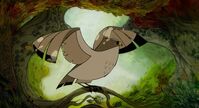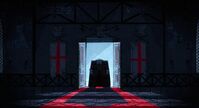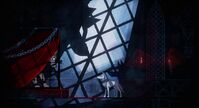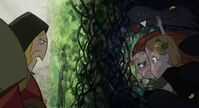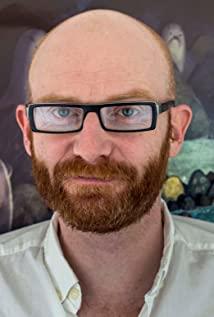Wanderer: Oh, is it time to break up? And I finally have to make you sad; I have seen that you become darker in the process.
Shadow: I blush, and the color of my blush is dark. I remembered that I often lay on your feet like a dog, when you--
Wanderer: Can I do something quickly to make you like it? Do you have any wishes?
Shadow: No, unless it was the wish expressed by the philosophical "dog" in front of the great Alexander: To make a little room for me from the sun, I feel too cold.
Wanderer: What should I do?
Shadow: Go under the fir tree and look back towards the mountain; the sun has set.
Wanderer:-Where are you? Where are you?
-Nietzsche, "The Wanderer and His Shadow"
sequence
In terms of the plot alone, a few words can tell the outline of the movie "Wolfwalker". But if you continue to dig, you can find that this work hides more content. Just like in a spotlight, an area is illuminated surprisingly, and the contents inside are clearly identifiable. And in the dark where the light can't reach, it's not empty. Compared with the straightforward plot, what makes me feel more in the movie is the overtones of the character’s dialogue, the vague symbols in the bright composition, the emotional roar... In general, it is those that have not been directly expressed. The part that came out in the dark revealed to me those deep meanings.
"Tao Te Ching" once said, "Tao can be Tao, very Tao. Name can be named, very famous." The original (in this article refers to Tao, the same below) is like an open void, a flow of nothingness, a thought Unable to grasp. Thought is also language (Haman language), so it is also inexplicable with language, that is, the original is the so-called "unspeakable thing". Along with this process, the knowledge about the original is like the sublimation of dry ice, quickly dissipating in the air. Those inexplicable, entangled and vaguely mixed floccules are filtered out as knowledge flows into the sieve of thinking. Only a small amount of clear liquid is left to be understood by the intellect and presented as a constructive theory. As for those parts that are filtered out, they are not completely disappeared, but turned into ethereal scum, walking on the surface of the water ("God's Spirit is on the water", "Bible" Genesis 1:1), and become only Something that can be comprehended by comprehension.
Therefore, my attempt here is just to express my understanding of the original through the interpretation of the film. Because even if it is "unspeakable", people still desire to speak. As the existence of finiteness, human beings tend to be infinite. This is the imprint engraved on the human soul, and it is the way for the individual to achieve goodness. In this sense, the act of watching a movie can also be seen as participating in a certain ritual, perhaps like a Zoroastrian cultivator, gazing at the flames in a cave. Although it is a group of people performing the same kind of ritual, the perception that each person gets after the ritual is different, because it is an individual experience that belongs to the participants themselves.
1. History
The story takes place in Ireland, and perhaps the Celtics first arrived in this land. What is constantly playing on this land is a history of aggression and resistance. Facing the lush forest, the ancient Romans chose to retreat to Britannia. The burning, killing and looting of the Vikings once wiped out the knowledge and civilization of Ireland, but with the fleeting phenomenon of the North Sea Empire, the land returned to tranquility. The struggle with the English was more protracted. The wedding of the "Strong Archer" and Eva opened England's rule over Ireland for more than eight hundred years, but the differences of faith proved to be difficult to reconcile. In the end, Irene, the name affectionately called by countless poets, was not as a dim accessory on the crown of the British king, but as an alexandrite in the silver ocean, radiating a light of freedom and pride.
Vico once stated that from barbarism to civilization to barbaric return, there is a hidden line of divine manipulation running through (for details, see Vico's baroque-like magnificent and magnificent masterpiece "New Science"). Accordingly, the above statement is not only a microcosm of the history of the Irish nation, but also a microcosm of the eternal history of the ideals of the entire human race. Looking at this movie from this perspective, the wolfwalkers in the forest and the people living in the city actually represent the two social structures that have appeared in human history (they are not absolutely opposite, but as different historical stages. The products together constitute a link in the evolution of human history). The society of Wolf Walkers in the film symbolizes the early civilization of mankind, when it was still a matriarchal clan society. Female patriarchs (wolf walkers who have mastered the secrets of men and wolves for generations) dominate a series of powers including religion and foreign wars, and through ceremonies ensure the succession of clan leadership among women. Men (that is, packs of wolves) as members of the clan undertake hunting-based manual labor, and participate in the core activities of the clan as ritual participants (but do not have the ability of wolf walkers such as healing, casual humanization, etc.). The opposite is the autocratic monarchy system in the city, which is a male-dominated "patriarchal" rule (combined with history, the 17th century was also the era of unprecedented power of European feudal monarchs).
In a society dominated by women or men, its internal operation is driven by two distinct emotions, " love " or " fear ". The primitive matrilineal clan society advocated "love" and cared for every member of the clan as if he loved himself. In the film, it is shown that even though Robin's father shot Maeve's mother, Maeve's mother accepted him as a member of the pack of wolves as the clan leader. The male autocratic society emphasizes "fear" and maintains social stability with a violent army and strict laws. Excessive "fear" makes the people live in terror, as if there is always a cloud over their heads. Whether it is the familiar daily life or the unfamiliar outside world (Wolfwalker's Forest), they are afraid and afraid, which undoubtedly affects their behavior. In the film, it shows Robin’s father’s fear of losing Robin, the protector of the country’s bloody repression of Wolfwalkers (here again can be seen as a symbol of the aboriginal people of Ireland), the city seems to be well-ordered but actually suppresses machinery. Work life and so on.
2. Nature
Nature is one of the important themes of this film, but our modern understanding of "nature" and people in ancient times (in this article generally refers to the human beings in the ancient Greek period and before the Spring and Autumn Period and Warring States period in China, hereafter collectively referred to as " The ancients") is completely different. Modern Western European philosophy since Descartes has paid more attention to the discussion of epistemology. The shift from ontology to epistemology in philosophy has profoundly affected people's way of thinking and practice. Especially after the Enlightenment, most people generally had "a firm belief in a purely human rationality and a complete subjective conviction for all thinking and cognitive activities", and that the natural world was "completely irrational and thoughtless." . (Xie Lin's "On the Essence of Human Freedom and Related Objects" foreword). Since man is the subject of cognition, the relationship between man and nature is actually opposite, and a long gap separates the two. This establishes the theory of “two natures”—“the first nature” is the real nature, which we cannot really know (according to Vico’s creation-truth principle, since nature was not created by us, we The truth in nature cannot be understood objectively); and the nature we usually understand is the "second nature". That is to say, the natural world is subjectively understood by humans as objects, and various concepts are formed by observing humans, and various theories are constructed to try to understand nature. Kant interprets this method as teleological judgment, stating that before experience, in order to prove the objective reality of nature, "there must be a kind of mysticism ahead of it. It just puts the concept of purpose into the nature of things, but This concept is not obtained from the object and its empirical knowledge, so it is more used to make nature understandable according to the analogy of a subjective basis connected with the appearance in our minds, but not from the objective basis to understand nature. "(Kant's Critique of Judgment, Part Two, Section 61).
As for how the ancients understood nature? Due to the limitations of modern thinking, it is quite difficult to completely transform oneself into the way of thinking of the ancients. Therefore, it is necessary to use ancient classics and other historical materials to restore the thoughts and thoughts of the ancient people at the time through various methods such as etymology and anthropology. Teacher Qian Jinduo once said in class that "nature" means "emergence" in ancient Greek. Corresponding to Chinese Taoism, "nature" is actually "natural", it is what a thing is as it is. On the one hand, man is not independent of nature, and there is no unbridgeable gap between man and nature. Rather, human beings are actually part of nature. They are born in nature and are organically unified with nature. Therefore, the ancients always grasped nature from the perspective of human-nature as a whole . On the other hand, because of the ubiquity of nature, she has also become an important source of early human poetic wisdom, revealing truth from the absolute. By imitating nature, the ancients formed their own art and culture (the natural themes in the film also implied a variety of cultural ideas such as shaman, druid, and Christianity. Due to the limited level of study, it will not be carried out for the time being. Further discussion), and try to achieve integration with nature in this way (imitation).
At that time in the film, the original knowledge of thinking about nature has been lost (let alone contemporary). The reason why the heroine Robin is set as a little girl is to facilitate a more in-depth discussion of the topic of nature. Because compared with adults, children look at the outside world in a completely different way. Compared with abstract rational thinking, imagination is the main way children understand the world in this period. It can be said that they live in a magical world. It’s not their interest to ask why things are so inferential and deductive. They can be extremely happy simply because things exist as they are, and enter a state of harmony between things and themselves through the "game" relationship with external things. In the sense of "Dao follows nature"). It is precisely because of this that Robin can integrate into the wolfwalker society more easily than adults. In the forest, her mind is freed from the depressive shackles of city life, and is rooted deep in her heart while running. The free nature is released.
The society represented by the wolf walkers in the film is a symbol of the integration of man and nature. They are not only within the clan, they regard every member of the clan as one (because they all came from nature). Moreover, outside the clan, one sees oneself and nature as one. In the face of nature, they use not only their eyes but also the various organs of the body to perceive (that is, synaesthesia). They "are full of strong sensations and broad imagination (Vico's "New Science" Introduction 6)" (now, these abilities are still retained in childhood, and often manifested, as they grow up gradually subject to social rules (spiritual) The symbolic order in the analysis) is inhibited and gradually degenerates). They stepped on the ground to feel the bearing of the earth, and the moonlight above their heads felt the temperature of the universe. These can be regarded as a kind of realization in the flesh. They enjoy the gifts of nature, and they are also grateful for the selfless giving of nature. Their practical activities are also imitating nature through experience, and thus they have mastered the healing and restoration abilities rooted in the essence of life.
And it is a kind of separation thought caused by the realization that "man and nature are opposed to each other" . In education, "most of the content that people must learn is just to master the existing knowledge. Because of this, people divide knowledge into various branches as much as possible, and then crush the overall living organic structure. As the smallest fragments" (Second Lecture of "Academic Research Methodology" by Xie Lin). The educators of those academic institutions, because they underestimate individual perceptions and emphasize abstract rationality, "have no ability to construct the science they are engaged in from their own, and they have no ability to explain this science through an internal, living intuition. This science will inevitably be taught in a historical way" (ibid., Schelling "Academic Research Methodology"). In practical activities, people emphasize the experimental methods of natural sciences, through experiments to form theories of induction and formation of empirical things, in order to master the laws of nature. As everyone knows, "theory and experiment are at the same level", and theory and experience are not opposites. "Theoretical concept itself contains a connection with particularity, followed by a connection with experience... In fact, the only difference between theory and experience is that theory is to get rid of all kinds of accidents through abstraction. Conditions allow experience to be presented in its original form. The key lies in such a refinement and the purely presenting of natural actions in every phenomenon. These are precisely the tasks of experiments" (Schelling, "Academic Research Methodology" "Lecture 11). They are blindly "faithful to their own concepts", but they don't know that the concepts and experiments are "only devoted to stating or presenting the phenomenon itself." The concept is nothing but a "monument to the disappearing phenomena... these phenomena are not anything lasting (fixed things) at all" (Schelling's "On the Soul of the World" on the origin of universal organisms), the concept is neither absolute It is not eternal, it is only a product of a certain level, and it appears as if it is lasting and unchanging. "The only things that cannot be moved are concepts (on a certain level), and those phenomena must continue to express this concept" (ibid., Schelling's "On the Soul of the World"). Therefore, no matter the concept, theory or experiment, there is a certain "empty formalism" inside, which is far from the real natural science.
Three, return
It has simply expounded the history as the reality of ideas, and the nature as the actual ideas. Based on this, I want to talk briefly about the discussion of the return of the soul under a metaphysical form. This is also the theme that I personally think this movie wants to express the most. It is a return of the individual to the whole, the return of the finite to the infinite, and the return of the absolute identity after abandoning oneself. For the state reached after the return, the ancients called it "the unity of man and nature".
Regarding the discussion of "heaven" and "person", the Tao Te Ching once recorded: "Humans follow the earth, the earth follows the sky, the heavens follow the Tao, and the Tao follows the natural." "Farland" points out a certain terrestrial nature of man, that is, man is fundamentally territorial. The earth is a manifestation of real nature, and it is emphasized here (not to mention the human law of water, human law of fire), because the real manifestation of nature, including "generation" and many other forces are rooted in the earth (because of also I haven't started to read Heidegger's related works, so I can only talk about my current understanding). "Tianfa Dao", "Shu Wen Jie Zi" says "Heaven is the supremacy, from one big.", and in the note, "the one who is the supreme, the man is the supreme", "the supremacy is the same." Also, therefore, from one big", it shows that heaven and one are deeply related, and one point is undoubtedly Tao. The sky directly imitates the Tao, so I think the meaning here is that the "sky" is presented as an idea constructed as an absolute unity (Tao) (the level is limited and cannot be expanded here). "Tao follows nature", the "nature" here does not refer to the real nature, but the free nature. On the level of freedom, Tao and nature are absolutely identical, and the unity of nature and man, in other words, is to achieve absolute identity.
And how does man achieve the unity of nature and man? Here I will only briefly talk about two aspects, "goodness" and "morality". The "goodness" and "morality" here are both discussed on the moral level in the general sense. "Goodness" is "good", and the collection of all good is "completeness" or "best goodness". Human pursuit of perfection means that the individual achieves perfection within him by constantly sublating himself. "Germany" means "power", which is the most original force, in Nietzsche's words, "will to power". And "the supreme will to power" is "to brand the characteristics of existence" (Nietzsche's "will to power" 7 [54]). Both "goodness" and "morality" point to the existence of human beings. The existence of human beings as individuals understands the world conceptually from the inside, and transforms the world from the outside in reality. Marx said that "philosophers just interpret the world in different ways, and the problem is to change the world." No matter how to understand the world, the final goal is to transform the world, that is, practical activities (because the discussion continues, there will be endless so Stop here). Transforming the world, what a difficult and tortuous Odyssey! There is no theory that can guide this return journey. When faced with the leaping of a living and special individual, it immediately degenerates into a desiccated gray-white deprivation and escapes. Only through practical activities based on oneself and full of personal understanding can the initial gloom be overcome, and the light hidden in the interior will bloom.
And what is the use of the explanations I have made above, it is still too far away from actual practice after all. All explanations are always vague and vague in front of the original, and what you really want to express can never be accurately described. What can be understood tends to a certain structure, but the changing reality is constantly being deconstructed. We are always at a loss in the face of reality when it comes to events. We perceive it solely from the body, consider it to happen by accident, and understand it as occasions. But in fact, before the physical perception, the advent event has already been directly enlightened in the mind (partly refer to Vico's "University Opening Ceremony Speech Collection"). Rather, the advent event is inevitably called by the soul. The purpose of mind call for advent events that seem to be accidental is to allow individuals to realize the infinite desire of the soul to return to completeness through continuous resolution of the advent events. In other words, the resolution of everything in reality implies the possibility of an individual to realize the unity of nature and man. As the advent event continues to be resolved, it leads to a gradual increase in the potential order. Just as starting from the dark, gloomy and irrational night that was born at first, it reaches the pure light of the last eternal reason. What we need here is a pair of long legs! Come to overcome the "spirit of gravity" (Nietzsche's "So Zarathustra"), and everything that hinders people's progress and the return of the soul to fullness is the spirit of gravity.
Although the shadow disappeared when the sun went down, the shadow was actually the same as the wanderer. So the beginning is not a negative story, but a positive story. The setting sun will inevitably rise, and all the light will return to the sun. The burning sun hangs high in the sky, proclaiming the arrival of the great noon!
postscript
This article is mainly based on Schelling's philosophy that is currently being read, combined with previous reading experience, and tries to express one's own views on the original problem. Generally speaking, I am still not satisfied. At the end of the writing, there are some anticlimactic, please forgive me. The full text is only my naive expression of philosophy at the current learning stage, and only represents my simple understanding. Only the philosophical level is involved, and there is no religious standpoint. Many ideas in the article have benefited from the video of Teacher Qian Jinduo (I don’t understand it very well), I would like to express my deep gratitude!
View more about Wolfwalkers reviews



